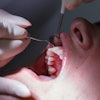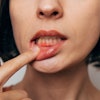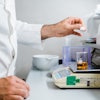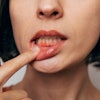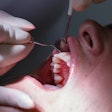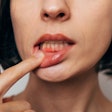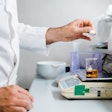
Have you been brushing your teeth a little too rough and noticed your gums were bleeding? Or maybe you were flossing a bit too intense and noticed a few spots of blood? You're not alone. Almost 94% of the U.S. population has some form of bleeding or inflamed gums.
If gums are healthy, a little aggressive brushing (while not recommended for many reasons) isn't going to make your gums bleed. Bleeding gums are your warning sign that your mouth is experiencing the early stages of gingivitis or periodontal disease.
This article is going to look at what bleeding gums mean, and I'll share a unique way that may halt the progression of periodontal disease.
Bleeding gums and periodontal disease
 Dr. Alvin Danenberg.
Dr. Alvin Danenberg.Bleeding gums are signs of the early stages of periodontal disease, which include gingivitis and periodontitis. Gingivitis is an infection only in the gum tissues. The infection-causing bleeding gums (gingivitis) can progress under the gum tissues to damage the jawbone, which is known as periodontitis. But not all cases of gingivitis turn into periodontitis. When periodontitis occurs, it can destroy the jawbone, eventually causing teeth to be lost.
An unhealthy gut, poor food choices, inefficient oral hygiene, and toxic lifestyle choices contribute to bleeding gums and other forms of periodontal disease. I've summarized this in prior articles on leaky gut and leaky mouth.
One thing is certain: If you have bleeding gums, then inflammation and infection will continue to spread from your mouth to other areas of your body. Make no mistake about it. Many chronic diseases have been shown to have their origin from active periodontal disease.
Mitochondria and molecular hydrogen
It appears that active periodontal disease may be the direct result of specific virulent bacteria causing an overproduction of free radicals in the mitochondria of gum tissue cells.
The mitochondria are like the batteries in a flashlight. The mitochondria provide the electrical energy to power that cell to function as it is designed to function -- just as the batteries in a flashlight create the power for the flashlight to work.
When these free radicals are neutralized, the infection tends to be tamed, and further destruction from periodontal disease may be reduced even though the bacteria are still present.
So that brings up a fascinating question: Is there something that can eliminate the damaging free radical production in the mitochondria of the gum tissues, which could stop the progression of periodontal disease?
The answer is yes. Molecular hydrogen.
Hydrogen-rich water and oral health
Nanobubbles of molecular hydrogen can be dispersed in water to create hydrogen-rich water. Drinking hydrogen-rich water can increase the concentration of molecular hydrogen in blood and tissues, and molecular hydrogen has been shown to neutralize damaging free radicals.
Furthermore, drinking hydrogen-rich water may neutralize the excess free radicals and inflammatory reactions in the gum and surrounding tissues. Here are a few peer-reviewed medical papers demonstrating the actions of hydrogen-rich water on periodontal disease:
- Hydrogen-rich water had antibacterial effects on specific pathogens that cause periodontal disease (Int Journal Oral Biol, June 30, 2013, Vol. 38:2, pp. 81-85).
- Drinking hydrogen-rich water further reduced inflammation in the tissues and enhanced the effects of nonsurgical periodontal treatment in 13 human patients with periodontitis (Antioxidants, July 9, 2015, Vol. 4:3, pp.513-522).
- Hydrogen-rich water neutralized free radicals in infected gum tissue cells, protecting them from oxidative damage and promoting wound healing (Human Cell, November 1, 2016, Vol. 30, pp.72-87).
- Molecular hydrogen suppressed periodontitis progression by decreasing gingival oxidative stress, which is the result of excess free radical production (Mol Cell Biochem, September 17, 2021, Vol. 477, pp.99-104).
So, drinking molecular hydrogen dispersed as nanobubbles in water appears to be an excellent adjunctive treatment for periodontal disease.
My experiment with hydrogen-rich water
I wrote about molecular hydrogen and hydrogen-rich water in January 2022. In my blog post, I discussed the documented medical research showing the overall health benefits of molecular hydrogen as well as why and how I drink hydrogen-rich water.
The product I use is HRW Rejuvenation Tablets. These patented tablets contain magnesium (mg). Chemically, when magnesium nanoparticles react with water, nanosized bubbles of hydrogen gas are produced.
Here's how I consume hydrogen-rich water:
- Dissolve one tablet of HRW Rejuvenation in 250 mL (about 8 oz.) of spring water twice per day: once in the morning and once in the afternoon. I consume each glass on an empty stomach.
- Wait for the tablet to completely dissolve. When it does, the water looks very cloudy. It's important to let the tablet completely dissolve and to use water that is not carbonated.
- Drink the solution immediately. If the cloudiness goes away, the hydrogen gas will be gone, and the benefit of the hydrogen-infused water will be lost.
One recent study suggested that 7.5 mg/L (15 ppm) of molecular hydrogen per day can provide significant clinical results (Exp Gerontol, October 1, 2021, Vol. 155, 111574). I double that dose. To reach a dose of 15mg/L per day, I dissolve two tablets in 500 mL of water in the morning and again in the afternoon.
Your takeaway
You can improve your periodontal health by reducing free radical production in the mitochondria of unhealthy gum tissue cells. Excess free radicals allow this infection to progress. Consuming hydrogen-rich water may help neutralize these free radicals and assist periodontal tissues to heal.
As an additional and significant benefit, drinking hydrogen-rich water will provide molecular hydrogen to all parts of your body and will help neutralize unhealthy and damaging excess free radicals wherever they exist.
Dr. Alvin Danenberg has retired from the private practice of periodontics in Bluffton, SC. He continues to be on the faculty of the College of Integrative Medicine and created its integrative periodontal teaching module. He also spent two years as chief of periodontics at Charleston Air Force Base earlier in his career. His website is drdanenberg.com.
The comments and observations expressed herein do not necessarily reflect the opinions of DrBicuspid.com, nor should they be construed as an endorsement or admonishment of any particular idea, vendor, or organization or as medical advice.
